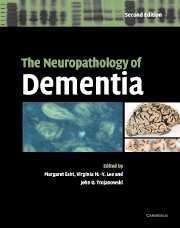Book contents
- Frontmatter
- Contents
- List of contributors
- List of abbreviations
- Preface to second edition
- 1 Definition, clinical features and neuroanatomical basis of dementia
- 2 Important anatomical landmarks in the brain in dementia
- 3 Practical approach to pathological diagnosis
- 4 Morphometric methods and dementia
- 5 Safety precautions in laboratories involved with dementia diagnosis and research
- 6 Molecular diagnosis of dementia
- 7 Neuropathology of the ageing brain
- 8 Neuroimaging Alzheimer's disease
- 9 Alzheimer's disease
- 10 Down's syndrome and Alzheimer's disease
- 11 Sporadic tauopathies: Pick's disease, corticobasal degeneration, progressive supranuclear palsy and argyrophilic grain disease
- 12 Hereditary tauopathies and idiopathic frontotemporal dementias
- 13 Vascular dementias
- 14 Familial and sporadic cerebral amyloid angiopathies associated with dementia and the BRI dementias
- 15 Parkinson's disease, dementia with Lewy bodies, multiple system atrophy and the spectrum of diseases with α-synuclein inclusions
- 16 Huntington's disease
- 17 Human prion diseases
- 18 Alcoholism and dementia
- 19 Hydrocephalus and dementia
- 20 Head injury and dementia
- 21 Infectious (and inflammatory) diseases causing dementia
- 22 Schizophrenia and its dementia
- 23 Other diseases that cause dementia
- 24 Transgenic mouse models of neurodegenerative disease
- Appendix: Dementia brain banks
- Index
18 - Alcoholism and dementia
Published online by Cambridge University Press: 12 October 2009
- Frontmatter
- Contents
- List of contributors
- List of abbreviations
- Preface to second edition
- 1 Definition, clinical features and neuroanatomical basis of dementia
- 2 Important anatomical landmarks in the brain in dementia
- 3 Practical approach to pathological diagnosis
- 4 Morphometric methods and dementia
- 5 Safety precautions in laboratories involved with dementia diagnosis and research
- 6 Molecular diagnosis of dementia
- 7 Neuropathology of the ageing brain
- 8 Neuroimaging Alzheimer's disease
- 9 Alzheimer's disease
- 10 Down's syndrome and Alzheimer's disease
- 11 Sporadic tauopathies: Pick's disease, corticobasal degeneration, progressive supranuclear palsy and argyrophilic grain disease
- 12 Hereditary tauopathies and idiopathic frontotemporal dementias
- 13 Vascular dementias
- 14 Familial and sporadic cerebral amyloid angiopathies associated with dementia and the BRI dementias
- 15 Parkinson's disease, dementia with Lewy bodies, multiple system atrophy and the spectrum of diseases with α-synuclein inclusions
- 16 Huntington's disease
- 17 Human prion diseases
- 18 Alcoholism and dementia
- 19 Hydrocephalus and dementia
- 20 Head injury and dementia
- 21 Infectious (and inflammatory) diseases causing dementia
- 22 Schizophrenia and its dementia
- 23 Other diseases that cause dementia
- 24 Transgenic mouse models of neurodegenerative disease
- Appendix: Dementia brain banks
- Index
Summary
Introduction
There is little doubt that excessive consumption of alcohol over a considerable period of time leads to an impairment of cognitive function. Specific alcohol-related disorders such as the Wernicke–Korsakoff syndrome, hepatic encephalopathy, and pellagra cause clinical dementia syndromes but when these have been excluded there is still a considerable number of alcoholics who can be classified as demented. The Liverpool Longitudinal Study of mental health of the elderly residing in a community dwelling found that dementia was 4.6 times more likely to occur in men aged 65 and older who had a lifetime history of heavy drinking (Saunders et al., 1991). A more recent epidemiological study of older African-American men found that increasing alcohol consumption was associated with a worsening performance on dementia screening scales (Hendrie et al., 1996). In a sample of 130 cognitively impaired residents of long-term care facilities, alcohol-related dementia comprised 24% of this population compared with Alzheimer's disease (35%), vascular dementia (19%), and other causes (22%) (Carlen et al., 1994). The most commonly used clinical definition of alcohol-related dementia is given in the Diagnostic and Statistical Manual Version IV (DSM IV) (Frances, 1994). This definition requires the presence of dementia that, in the opinion of the clinician, is intrinsically linked to the abuse of alcohol. The diagnostic criteria are vague and subjective and there have been no published validation or reliability reports using these criteria. Two recent papers dealing with operational diagnostic criteria in alcohol-related disorders might help clarify the issue.
- Type
- Chapter
- Information
- The Neuropathology of Dementia , pp. 427 - 441Publisher: Cambridge University PressPrint publication year: 2004
- 2
- Cited by

